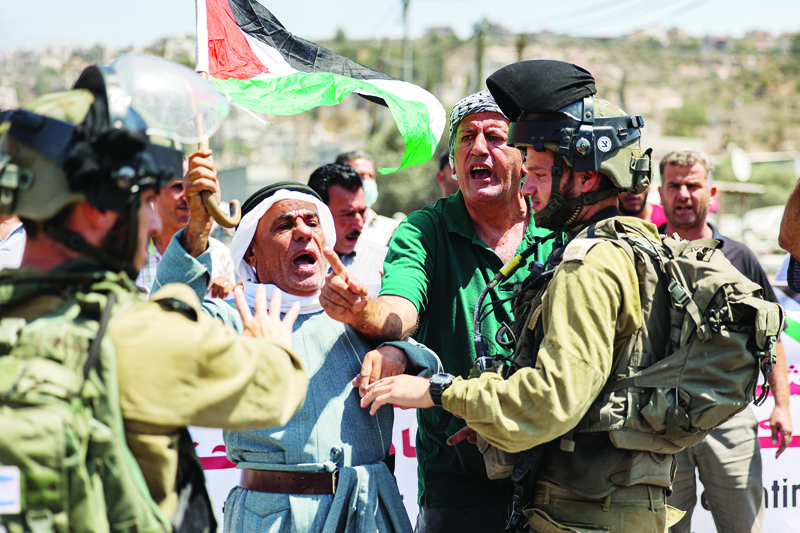 BEITA, Palestinian Territories: Palestinian locals from the village of Beita in the north of occupied West Bank yesterday argue with Zionist soldiers as they protest against the creation of a new road for Jewish settlers.—AFP
BEITA, Palestinian Territories: Palestinian locals from the village of Beita in the north of occupied West Bank yesterday argue with Zionist soldiers as they protest against the creation of a new road for Jewish settlers.—AFP
BEITA, Palestinian Territories: Using laser pointers and noisy horns to torment Jewish settlers across the valley, Palestinians in Beita have set themselves apart from others demonstrating against Zionist occupation of the West Bank. But beyond attention-grabbing tactics, protesters in the Palestinian town near Nablus insist their weeks-long campaign against the wildcat settlement of Eviatar is distinct for another reason.
They describe it as a grassroots movement, not inspired or directed by Fatah secularists who control the Palestinian Authority in the West Bank, or their rivals from the Hamas that runs the Gaza Strip. "Here there is only one flag: That of Palestine. There are no factions," Said Hamayel told AFP.
"We are doing from below what Palestinian leaders cannot do from above," argued Hamayel, who said his 15-year-old son Mohammed was killed by Zionist army gunfire in a mid-June protest. The army said it had opened fire to suppress "rioters". The Beita protests broke out in May as a group of hard-line settlers erected a Jewish community on a nearby hilltop.
All settlements are considered illegal under international law, but Zionist entity has granted authorization to such communities across the West Bank, a territory it has occupied since 1967. But Eviatar was built without Zionist approval and the government struck a deal with settlers for their evacuation on July 2, while it studied the land to evaluate the prospect of eventual authorization.
Zionist troops stationed at Eviatar since the settlers left have faced ongoing protests from the people of Beita, who number about 12,500 and say the surrounding land belongs to them. More than 700 Palestinians have been injured and at least seven have been killed since the unrest erupted in May, according to the Palestinian health ministry. Hamayel, who is still grieving over the loss of his son, voiced pride in what he termed the Beita "model".
"The Zionists want to stamp out our new form of popular resistance. They are afraid of it." He said the Beita movement stood in contrast to the PA, led by 86-year-old president Mahmud Abbas, which "does nothing but issue statements" denouncing Zionist's occupation. Palestinian politics have been fractured since 2007, the year Hamas took over Gaza after Fatah refused to recognize the Islamists' election win.
Despite various reconciliation bids, bitter acrimony between the factions persists. Fatah has remained entrenched in the West Bank, with Hamas running Gaza, but experts said events earlier this year altered sentiments among ordinary Palestinians. Abbas cancelled the first scheduled Palestinian elections in 15 years, as street rallies in support of Palestinians facing Zionist eviction in annexed east Jerusalem gained momentum. With tensions building in the Holy City and elsewhere, Zionist forces clashed with Palestinians at Jerusalem's Al-Aqsa mosque compound, Islam's third holiest site. - AFP
.jpg)
